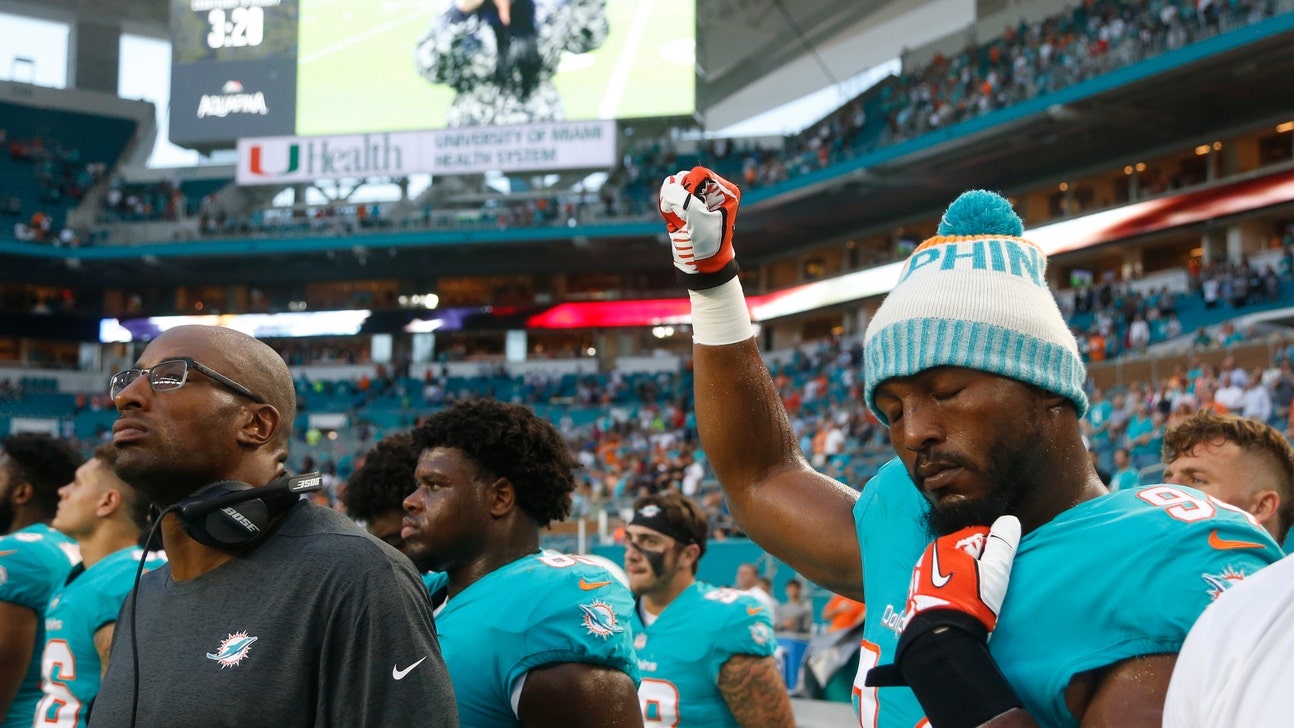
Column: Is there a path forward in NFL protests?
The players kneel. The president tweets.
And the great divide over protests during the national anthem at NFL games grows even wider.
So far the players — at least a handful of them — aren't backing down. A few took a knee in the first weekend of exhibition games, at least two raised a fist during the anthem, and several stayed in the locker room as their way of making a statement.
The NFL reacted by doing nothing, at least publicly. The league's hastily adopted new policy on protests during the anthem is on hold while it holds talks with the players' union on an issue that figures to grow more contentious with every game.
That didn't stop President Donald Trump from weighing in on Twitter, calling for any player who doesn't stand during the national anthem to be suspended without pay.
For Trump, it's an issue that resonates with his base. For the protesting players, it's an issue of social injustice that needs to be raised.
The divide is not only splitting the country, but splintering the NFL.
"I think there are a lot of people that are supportive of the players and then there are a couple of people that have been very vocal against it," said Duane Brown, one of three Seahawks who protested. "Those people have power. We'll see what happens."
What has happened so far is that the protests that began with Colin Kaepernick taking a knee before a 49ers game two seasons ago show no signs of disappearing entirely. If anything, the first preseason games show that while most teams fell in line with the desires of their management, there are some players who aren't going to back down.
And that could cause major problems not only for protesting players but a league trying to keep its dominant place in American sports.
"The NFL is caught, they can't really win either way," said Eric Schiffer, the CEO of Reputation Management Consultants, a Los Angeles-based brand and crisis management firm. "They've now come to the conclusion they were alienating conservatives and attempted to mitigate it. But they have only so much they are able to do without alienating the core of their product, which is the players."
The fact the protests have been turned into something they were never intended to be is a big reason why a resolution will be so difficult. Kaepernick began kneeling during the anthem to protest social injustice against minorities, but Trump and others have portrayed it instead as a protest against the anthem itself and the country it stands for.
Still, an NFL spokesman said the league and the players' union are involved in "constructive" talks to resolve the issue. But they're in a battle with time, with the start of the regular season just a few weeks away.
They might want to start with one of the few good suggestions offered publicly so far. It came from Kenny Stills, the Miami wide receiver who took a knee during the national anthem in the Dolphins first preseason game.
Give Kaepernick and former teammate Eric Reid jobs, Stills said, and let players know you're serious.
"You can't say as a league you support the players and their protests and then blackball the players who initially started the protests," Stills said. "To come to the drawing board and talk about solutions, we need to start there as a league, and then we can start drawing up other solutions to some of these other problems."
Employing Kaepernick and Reid shouldn't be that much of a problem. Both are NFL players at the highest level, and both seem to have been blackballed from the league — at least unofficially — because of their protests.
Offer them up to every team in the league. Waive any salary cap to do it, and there should be some takers.
If no team bites, assign them through a lottery.
After that, it gets easier. Offer players something in exchange for not protesting during the anthem — perhaps a 30-second commercial spot to highlight social injustice at halftime of every nationally televised game.
The guess is players would respond favorably, partly because they have little alternative. By now they surely understand that their original cause has been hijacked and that they — along with the NFL — are in no-win situations.
Their points can still be made, and perhaps find a more receptive audience.
And, just maybe, the tweets will stop.